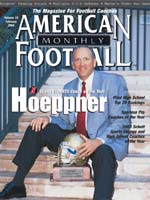AMERICAN FOOTBALL MONTHLY THE #1 RESOURCE FOR FOOTBALL COACHES
|
|
Article Categories
|
Schutt Sports College Coaches of the Yearby: Richard Scott© More from this issue
DIVISION I-AA
HOWARD SCHNELLENBERGER
Florida Atlantic University
Itís a long way from the Super Bowl and the Division I-A national
championship to Division I-AA coach of the year, but it didnít
take long for Howard Schnellenberger to close the gap.
At age 69, Schnellenberger is not only in his third season as the head coach
and director of football operations at Florida Atlantic, heís also the
founder of a fledgling program that has risen rapidly in a short time.
After a 4-6 debut in 2001 and a 2-9 record 2002, the Owls went 11-3 in 2003,
finished fourth in the final national polls and became the youngest start-up
program to advance to the NCAA playoffs. FAU played its first two pla....The full article can only be seen by subscribers.
Subscribe today!

|
|
|
NOT A SUBSCRIBER?
Subscribe
now to start receiving our monthly magazine PLUS get INSTANT
unlimited access to over 4000 pages of 100 percent football coaching
information, ONLY available at AmericanFootballMonthly.com!
|
|
|
HOME
|
MAGAZINE
|
SUBSCRIBE
|
ONLINE COLUMNISTS
|
COACHING VIDEOS
|
Copyright 2025, AmericanFootballMonthly.com
All Rights Reserved






